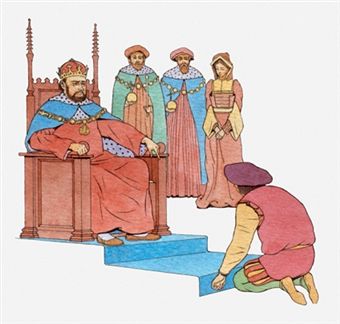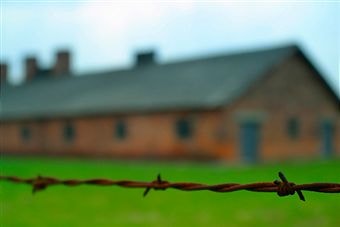داستان آن فرانک

The Story of Anne Frank
War, persecution, and economic depression affect not only adults, but also old people, children, babies, the sick and the handicapped. Since history is written mostly about politicians, soldiers, intellectuals and criminals, we don’t read very often about how events affect ordinary people. Now and then a special book will shed light on what it was like to live in the midst of terrible events. Such a book is “The Diary of Anne Frank.” Anne Frank was born in Frankfurt am Main, Germany, in 1929. Her father Otto Frank was a businessman who moved the family to the Netherlands in 1934. In Amsterdam, Otto started a company selling pectin to make jams and jellies. Later he began a second company that sold herbs for seasoning meat.
Otto Frank had decided to leave Germany because of the policies and personality of the new German Chancellor Adolph Hitler. Hitler had a personal hatred not only for Jewish people but also for everything Jewish. He felt that one way to strengthen Germany and solve its problems was to kill or drive out all the Jews. Hitler also felt that other groups, such as blacks, gypsies, the handicapped, homosexuals and the chronically unemployed should be eliminated. Then only strong healthy “true Germans” would be left.
Since Hitler had a plan to solve Germany’s economic problems, he received a lot of popular support. Very few Germans realized that he was mentally and emotionally unbalanced and would kill anyone who got in his way.
The Frank family was Jewish, and they felt that they would be safe in the Netherlands. However, in May 1940, Germany invaded the Netherlands and soon took over the government. In 1941, laws were passed to keep Jews separate from other Dutch citizens. The following year, Dutch Jews began to be shipped to concentration camps in Germany and Poland. Just before this began, Anne Frank, Otto’s younger daughter, received a diary for her 13th birthday. Less than a month later, the whole family went into hiding.
Otto Frank had made friends with the Dutch people who worked with him in his business operations. Now these friends were ready to help him, even though hiding Jews from the authorities was treated as a serious crime.
Behind Otto Frank’s business offices, there was another house that was not visible from the street. Here the Franks moved many of their things. Only a few trusted people knew they were living there. The Franks moved into these small rooms on July 6, 1942, and they lived there with another Jewish family, the Van Pels, until the police captured them on August 4, 1944. So, for more than two years, the two families never went outside. All their food and supplies had to be brought to them.
During this period, Anne Frank told her diary all her thoughts and fears. Like any teenage girl, she hoped that good things would happen to her, that she would become a writer or a movie star. She complained that her parents treated her like a child. She insisted that she was grown up.
She also talked about how difficult it was to live in a small area with seven other people and not be able to go outside. She wrote about the war and hoped that the Netherlands would soon be liberated from the Germans. Anne sometimes envied her older sister, Margot, who was so much more mature, and who never got into trouble. She and Margot wrote letters to each other to pass the time. Anne even had a romance with Peter van Pels, who was seventeen.
Then all their fears came true. All the eight Jews hiding in the house were arrested and eventually sent to the Auschwitz death camp in Poland. Although the war was ending, it did not end soon enough for the Frank family. Only Otto Frank survived the war.
One of their helpers, Miep Gies, saved Anne’s diary and kept it. After the war, Otto Frank decided to publish it. Since 1947 more than 20 million copies have been sold in 55 languages. Anne’s diary shows the terrible cost of hatred, persecution and war better than any history book.
Persecution

Source 1
PersecutePersecute somebody (for something) To treat somebody in a cruel and unfair way, especially because of their race, religion or political beliefs
Throughout history, people have been persecuted for their religious beliefs.
Persecuted minorities
Persecution noun [uncountable, countable]
The victims of religious persecution
They fled to Europe to escape persecution.
Usage note: Race and immigration
Prejudice and racismExperience/encounterracism/discrimination/prejudice/anti-semitism
Face/suffer persecution/discrimination
Fear/escape from/flee racial/political/religious persecution
Constitute/be a form of racial/race discrimination
Reflect/reveal/show/have a racial/cultural bias
Be biased/be prejudiced against (especially British English) black people/(both especially North American English) people of color/African Americans/Asians/Africans/Indians, etc.
Discriminate against minority groups/minorities
Perpetuate/conform to/fit/defy a common/popular/traditional/negative stereotype
Overcome/be blinded by deep-seated/racial/(especially North American English) race prejudice
Entrench/perpetuate racist attitudes
Hurl/shout (especially British English) racist abuse; (especially North American English) a racist/racial/ethnic slur
Challenge/confront racism/discrimination/prejudice
Combat/fight (against)/tackle blatant/overt/covert/subtle/institutional/systemic racism
Race and societyDamage/improve (especially British English) race relations
Practise/(especially US) practice (racial/religious) tolerance/segregation
Bridge/break down/transcend cultural/racial barriers
Encourage/promote social integration
Outlaw/end discrimination/slavery/segregation
Promote/embrace/celebrate cultural diversity
Conform to/challenge/violate (accepted/established/prevailing/dominant) social/cultural norms
Live in a multicultural society
Attack/criticize multiculturalism
Fight for/struggle for/promote racial equality
Perpetuate/reinforce economic and social inequality
Introduce/be for/be against (British English) positive discrimination/(especially North American English) affirmative action
Support/be active in/play a leading role in the civil rights movement
ImmigrationControl/restrict/limit/encourage immigration
Attract/draw a wave of immigrants
Assist/welcome refugees
House/shelter refugees and asylum seekers
Smuggle illegal immigrants into the UK
Deport/repatriate illegal immigrants/failed asylum seekers
Assimilate/integrate new immigrants
Employ/hire migrant workers
Exploit/rely on (cheap/illegal) immigrant labour/(especially US) labor
Apply for/gain/obtain/be granted/be denied (full) citizenship
Have/hold dual citizenship
Source 2
persecute [transitive]
to treat someone cruelly or unfairly over a period of time, especially because of their religious or political beliefs:
The Puritans left England to escape being persecuted.
persecution noun [uncountable and countable]
the persecution of writers who criticize the government
Intellectual

Source 1
Aperson who is well educated and enjoys activities in which they have to think seriously about things
source 2
an intelligent, well-educated person who spends time thinking about complicated ideas and discussing them [↪ academic]:
a leading British intellectual
Shed light on something

Source 1
Cast/shed/throw light on somethingTo make a problem, etc. easier to understand
Recent research has thrown new light on the causes of the disease.
source 2
to provide new information that makes a difficult subject or problem easier to understand:
Melanie was able to shed some light on the situation.
These discoveries may throw new light on the origins of the universe.
pectin Source 1
Asubstance similar to sugar that forms in fruit that is ready to eat, and is used to make jam/jelly firm as it is cooked
source 2
a chemical substance that is found in some fruits and is sometimes added to jam and jelly to make it less liquid
Herb

Source 1
Aplant whose leaves, flowers or seeds are used to flavour food, in medicines or for their pleasant smell. Parsley, mint and oregano are all herbs
Aherb garden
source 2
a small plant that is used to improve the taste of food, or to make medicine:
Sprinkle the dish with chopped fresh herbs.
Season

Source 1
To add salt, pepper, etc. to food in order to give it more flavour
Season the lamb with garlic.
Add the mushrooms, and season to taste (= add as much salt, pepper, etc. as you think is necessary).
source 2
to add salt, pepper etc to food you are cooking
season something with something Season the chicken with pepper.
Mix and season to taste (=add the amount of salt etc that you think tastes right).
Chronically

Chronic adjective
Lasting for a long time; difficult to cure or get rid of
Chronic bronchitis/arthritis/asthma
The country’s chronic unemployment problem
Achronic shortage of housing in rural areas
Opposite: acute
Chronically Adverb
Ahospital for the chronically ill
Get in the way of

Source 1
To prevent somebody from doing something; to prevent something from happening
He wouldn’t allow emotions to get in the way of him doing his job.
source 2
to prevent someone from doing something, or prevent something from happening:
Your social life must not get in the way of your studies.
Invade

Source 1
To enter a country, town, etc. using military force in order to take control of it
Troops invaded on August 9th that year.
Invade something When did the Romans invade Britain?
source 2
to enter a country, town, or area using military force, in order to take control of it:
The Romans invaded Britain 2000 years ago
Take over

To gain control of a political party, a country, etc
The army is threatening to take over if civil unrest continues.
source 2
to take control of something [↪ takeover]
take something ↔ overHis only reason for investing in the company was to take it over.
Ruth moved into our apartment and promptly took over.
Concentration camp

Source 1
Atype of prison, often consisting of a number of buildings inside a fence, where political prisoners, etc. Are kept in extremely bad conditions
ANazi concentration camp
source 2
a prison where political prisoners and other people who are not soldiers are kept and treated cruelly, especially during a war
Liberate

Source 1
Liberate somebody/something (from somebody/something) To free a country or a person from the control of somebody else
The city was liberated by the advancing army.
source 2
to free prisoners, a city, a country etc from someone’s control:
A few days later, our armies liberated the city.
Envy

Source 1
To wish you had the same qualities, possessions, opportunities, etc. as somebody else
Envy somebodyHe envied her—she seemed to have everything she could possibly want.
Envy something She has always envied my success.
Envy somebody somethingI envied him his good looks.
Envy somebody doing something I envy you having such a close family.
source 2
to wish that you had someone else’s possessions, abilities etc:
I really envy you and Ian, you seem so happy together.
She has a lifestyle which most people would envy.
envy somebody somethingHe envied Rosalind her youth and strength.